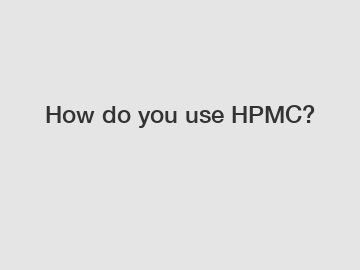How do you use HPMC?
Hydroxypropyl methylcellulose, also known as HPMC, is a versatile compound commonly used in various industries, including pharmaceuticals, construction, and food production. It is a cellulose-based polymer that is soluble in both cold and hot water, making it an ideal ingredient for a wide range of applications. In this article, we will explore how HPMC is used and the different ways it can benefit different industries.
**In Pharmaceutical Industry**.
In the pharmaceutical industry, HPMC is widely used as a coating agent for tablets and capsules. It helps to control the release of active ingredients, improve stability, and enhance the appearance of the dosage forms. HPMC is also used as a thickening agent in liquid formulations and as a binder in granules. Its versatility and compatibility with other ingredients make it a popular choice for pharmaceutical manufacturers.

**In Construction Industry**.
In the construction industry, HPMC is used in various applications, including tile adhesives, cement plasters, and self-leveling compounds. It acts as a thickening agent, water retention agent, and binder, improving the workability and performance of construction materials. HPMC helps to reduce cracking, improve adhesion, and enhance the overall quality of the final product. Its ability to provide consistent results and high-performance properties make it a preferred choice for construction projects.
**In Food Production**.
In the food industry, HPMC is used as a thickening agent, emulsifier, and stabilizer in a wide range of products, including sauces, soups, and dairy products. It helps to improve texture, viscosity, and shelf-life, giving food products a desirable appearance and mouthfeel. HPMC is also used in encapsulation and controlled release systems for flavorings, colors, and nutrients. Its non-toxic nature and excellent stability make it a safe and reliable ingredient for food manufacturers.
**In Personal Care Products**.
In personal care products, HPMC is used in cosmetics, skincare products, and hair care formulations. It acts as a gelling agent, film former, and emulsifier, improving the texture and performance of various products. HPMC helps to create stable emulsions, enhance skin hydration, and provide a smooth and luxurious feel. Its mild and non-irritating properties make it suitable for sensitive skin and delicate formulations.
**In Other Industries**.
Apart from these industries, HPMC is also used in textiles, paints, and adhesives. It helps to improve the rheological properties, stability, and performance of various products. HPMC is known for its excellent film-forming ability, water-solubility, and biocompatibility, making it a valuable ingredient in different applications. Its versatility and ease of use have made it a popular choice for manufacturers in various industries.
**Closing Paragraph**.
In conclusion, HPMC is a valuable ingredient with a wide range of applications in different industries. Its versatility, stability, and performance-enhancing properties make it an ideal choice for pharmaceuticals, construction, food production, personal care products, and many other sectors. Whether you are looking to improve the texture of a food product, enhance the performance of a construction material, or create a stable formulation for a skincare product, HPMC can meet your needs. Contact us today to learn more about how HPMC can benefit your industry and for assistance in finding the right grade for your application.
For more HPMC solubility in cold water, HPMC for dry mixed mortar, Cellulose Ether Series HPMC for Cement Mortarinformation, please contact us. We will provide professional answers.
220
0
0

Comments
All Comments (0)